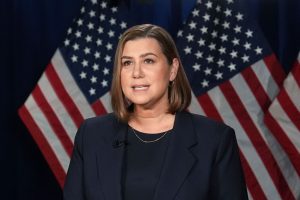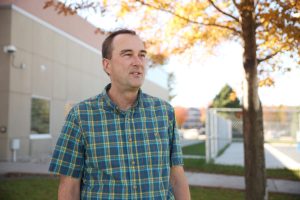
A Sioux Falls School District educator works with students at JFK Elementary School. (Courtesy of Sioux Falls School District)
I didn’t speak English in kindergarten. I didn’t even start learning it until first grade. And I didn’t really get it until second grade, when I met Mrs. Cavanaugh.
Every week, she would pull three of us out of class — a Vietnamese refugee (me), an Iraqi refugee, and a classmate whose parents had just opened a Mexican restaurant — and bring us into a little room with a round table. That’s where I learned what English could do. Not just how to use it, but how to love it.
That’s where I learned that my family had survived war, and that my classmate’s family had fled violence, too. That’s where we learned to listen to each other’s stories, and feel less alone in our own.
It’s hard to explain how much that meant, but I know what it gave me: everything.
Federal funding uncertainty risks destroying adult education programs in SD, directors say
I eventually transferred to Catholic school, where I got straight A’s, won essay contests, read my writing aloud to rooms full of parishioners, and even had some haikus published in a national anthology. We didn’t have the money to buy the book, so I never told my teacher I couldn’t share it with my mom. She was always working. She learned English the way a lot of immigrants do: on the job, because they can’t afford to take a class.
By sixth grade, I gave the class commencement speech. Same thing in eighth grade. In high school, I competed at nationals for speech and became editor of the paper. My senior year superlative was “most likely to be president,” even though I was one of the few who could never be.
All of that started in a small room at Anne Sullivan Elementary. It started with a public school teacher who saw us, and gave us the tools to see ourselves.
That’s why it hurts to see lawmakers work to dismantle the federal Department of Education and freeze billions in funding meant for schools like mine. The department doesn’t dictate curriculum. What it actually does is distribute federal support for low-income students, multilingual learners, special education services, and civil rights protections in schools. These programs exist so that kids like me can find their footing.
After nationwide outcry, the department recently released a portion of the frozen funds, roughly $1.3 billion, targeted specifically at after-school and summer learning programs. That’s an important step, especially for working families who rely on these programs for safe, enriching environments outside of regular classroom hours. But more than $5 billion in other critical education funding remains on hold. That includes support for teacher training, English language services, migrant education, adult literacy and student enrichment programs — resources that help kids thrive during the school day, not just after.
Here in the Sioux Falls School District, the impact is still unfolding. Of the anticipated $3.5 million shortfall, only about $250,000 has been restored so far — enough to support after-school tutoring. Core staffing plans will remain in place this year, but some non-staff initiatives like professional development, supplemental programs and contracted services have been paused. While English learner support staff will continue, the district says further program expansion may be limited without additional funding. Special education and mental health services aren’t directly impacted by the freeze, but flexible funding that could have enhanced or expanded those supports has been lost — for now. The district, like many others, is still waiting for additional guidance from the state and federal government.
Don’t miss new commentary: Sign up for our free newsletter.
I wouldn’t be here without that support. And I worry deeply for the kids who won’t get what I got. The kids who won’t have a Mrs. Cavanaugh. The kids who will never find their way to the words that could change their lives.
And even worse than the cuts is the silence. The silence from leaders who know better. Who know that children like me can thrive when they’re cared for, but choose to look the other way. I’ve spent years ghostwriting for admirable leaders. But lately I’ve started to wonder what good that’s done if they’re quiet now — if they won’t fight for what saved me, and eventually benefitted them.
Children aren’t resources to be groomed. They’re not workers-in-waiting. They’re not numbers in a cost-benefit analysis. They’re kids. And if they feel loved and respected, they’ll pay that forward a hundred times over. I’m proof of that and I am far from alone.
I don’t know where my classmates from that little roundtable ended up. But if I had to bet, I’d bet long on them. Just like I’d bet on that quiet 6-year-old me.
I just hope we can still build a world that bets on kids like us, too.





